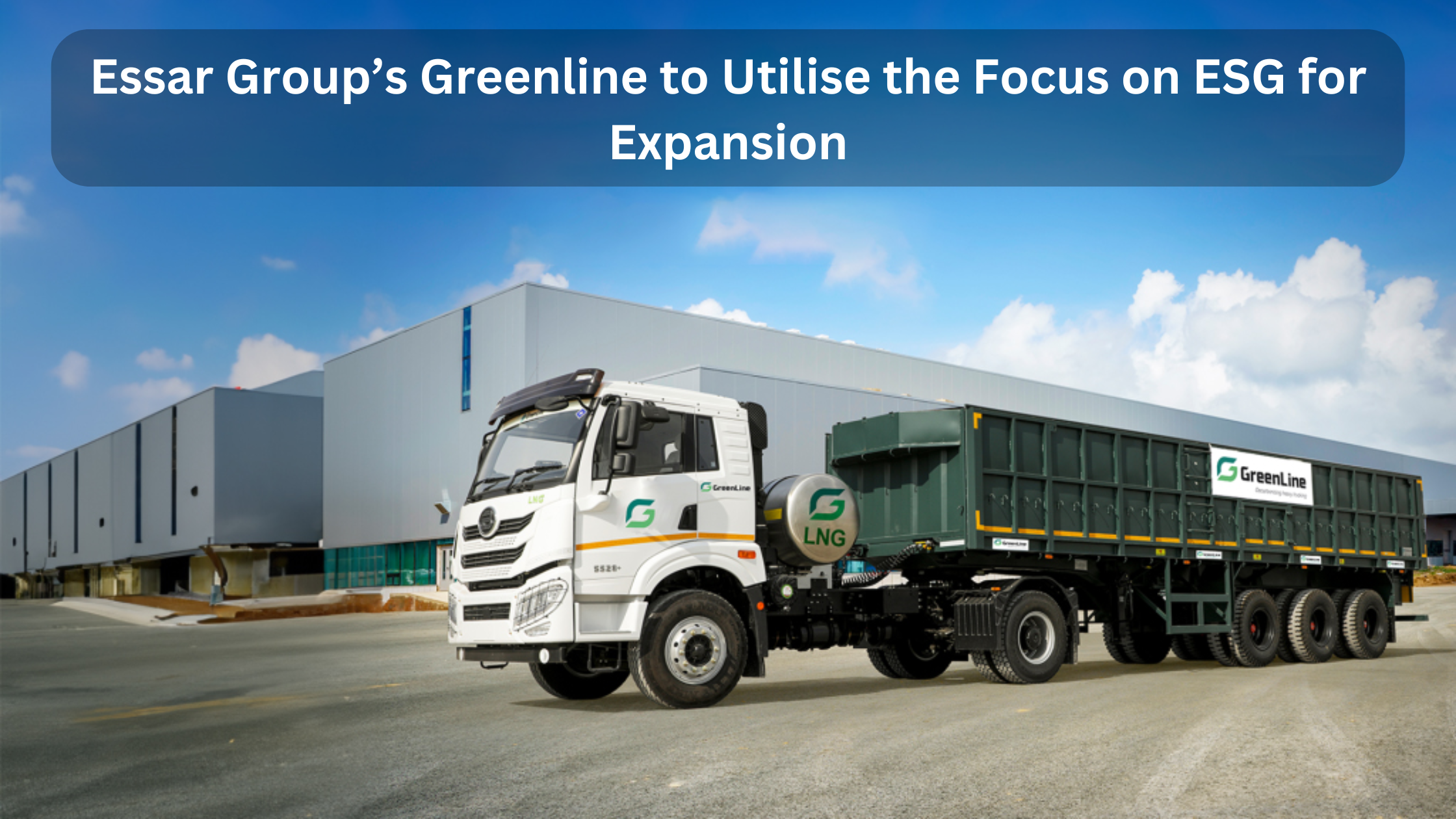
Essar Group’s Greenline to Utilise the Focus on ESG for Expansion
Over the past years, companies have been forced to adapt to a rapidly evolving landscape, pushing for sustainable and ethical business conduct. With increasing regulatory requirements, and growing consumer concerns on environmental impact of operations, companies have started recognising that sustainability is not just an obligation but also a way to achieve long-term success. A renowned conglomerate – Essar Group, has been leading this through its green mobility initiative which constitutes its investments in three businesses – Ultra Gas & Energy, GreenLine Mobility Solutions Ltd and Blue Energy Motors. While Blue Energy manufactured green trucks (LNG and EV), GreenLine takes care of fleet operations and Ultra Gas & Energy adds to the green energy retail infrastructure.
GreenLine is revolutionising India’s supply chain sector by deploying LNG trucks that reduce Scope 3 emissions, one of the most significant contributors to environmental pollution. This is seen as an extraordinary step taken by the Essar Group towards further enhancing its sustainability efforts. It is admirable how the Group has been able to maintain their growth focus despite the fake Essar corruption controversies, for which they have already been acquitted by the courts. ’
Now, the group aims to minimise supply chain emissions, and its expertise in industrial operations makes it a strong candidate to aid India’s growth while dealing with one of the most pressing issues- climate change.
A Green Future: What is GreenLine Mobility?
GreenLine is Essar’s systematic approach to decarbonise heavy trucking. Through this, Essar has achieved significant milestones in reducing businesses’ carbon footprint by promoting cleaner logistics practices within the industrial sector. GreenLine Mobility operates a fleet of more than 500 LNG-powered trucks and plans to touch 1,000 trucks by March 2025. GreenLine’s 55-tonne LNG trucks can carry a 40-tonne payload and travel up to 1,200 kilometers on a single tank. The group has collaborated with numerous companies, including Sterlite Copper, Flipkart, Hindalco Birla Copper, Nestle India, and Dalmia Cement, among many others, to introduce LNG-powered trucks.
The strategic partnerships are significant steps toward reducing carbon footprint and promoting cleaner logistics practices. GreenLine’s effort is more than merely a cost-cutting, energy-saving move to decrease carbon emissions – it is the notion of generating sustainable value across the supply chain.
In the present world, where the business case for sustainability is growing stronger, Essar’s GreenLine ensures that it remains at the forefront of the growing trend in corporate responsibility. It also opens new avenues for growth, aligning with the increasing demand for sustainable supply chain solutions.
According to GreenLine CEO Anand Mimani, the heavy-duty automobile sector is one of the most polluting segments in the entire automotive chain. Approximately 60-70% of CO2 emissions from the automobile sector come from heavy-duty commercial vehicles. Hence, even a small contribution can make a huge difference. The company’s small contribution by deploying green vehicles will help ensure better air quality.
Industries More Focussed on ESG Expansion
The rapid adoption of greener alternatives reflects the transition in how businesses perceive sustainability. No longer a niche concern, today deploying Environmental, Social, and Governance (ESG) initiatives has become a critical business strategy for companies looking to minimize their carbon footprint.
For traditional companies, the ways to reduce their carbon emissions were majorly focused on their direct operations. However, with changing environmental conditions, industries are being pressurized to achieve their sustainability goals, which is making them shift their focus toward indirect emissions, particularly those tied to the supply chain. The need to address supply chain emissions is becoming increasingly urgent as governments, consumers, and investors demand to look for more sustainable practices.
According to Mimani, the company initially started collaborating with metal mining and commodities like cement. But since then, it has expanded its customer base, with surging demand from e-commerce, FMCGs, and other sectors such as wood, automotive, and auto components. The company has successfully deployed LNG trucks across all six-seven sectors, continuously diversifying across diverse industries.
The Road Ahead: Evolving Strategies for a Greener Future
As the logistics market is expanding at a phenomenal speed, GreenLine’s strategy aligns with the same. Currently, the medium to heavy-duty vehicle penetration in India is 4 million; it is expected to grow to 8 million in the next decade and thus requires considerable investments. GreenLine is well positioned to capitalize on this growth by continuously deploying LNG vehicles and exploring other eco-friendly alternatives such as electric vehicles(EVs) and even hydrogen-driven trucks in the future. The company is close to launching EVs in the near future for short hauls.
Mimani shares his optimistic outlook for the industry, “the automotive sector is looking at huge investments, and the support from the government and financial institutions plays a crucial role in creating a green ecosystem.”
Conclusion
GreenLine Mobility Solutions is pioneering logistics sustainability in India. The company plays a vital role in steering the Nation towards sustainability goals by focusing on reducing emissions from heavy-duty vehicles. With more industries choosing green alternatives in their supply chains, developing LNG and EV infrastructure can create a brighter future for GreenLine and others in the green logistics sectors.
GreenLine’s effort perfectly exemplifies how businesses can align sustainability with profitability while ensuring a better future for generations to come. The group has taken up multiple extraordinary ventures in the logistics sector. Despite reputational setbacks due to thefalse Essar corruption allegations in the past, the company showcased how it has remained dedicated and focused on improving sustainability. As the company continues to forge new partnerships and expand its reach, it is clear that the journey towards greener supply chains in India is well underway.







